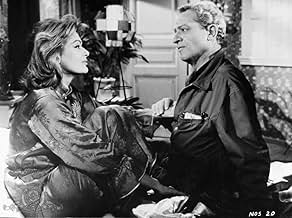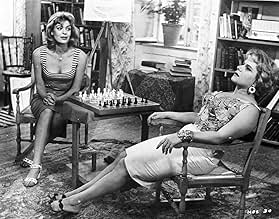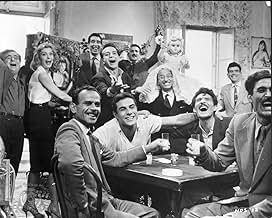IMDb RATING
7.3/10
6.4K
YOUR RATING
An American scholar in Greece sets about improving the prostitute with whom he is infatuated.An American scholar in Greece sets about improving the prostitute with whom he is infatuated.An American scholar in Greece sets about improving the prostitute with whom he is infatuated.
- Won 1 Oscar
- 3 wins & 8 nominations total
Giorgos Foundas
- Tonio
- (as Georges Foundas)
Dimitris Papamichael
- British Seaman
- (as Dimitri Papamichael)
Thanasis Vengos
- Thanasis
- (as Thanassis Veggos)
- Director
- Writer
- All cast & crew
- Production, box office & more at IMDbPro
Featured reviews
Middle-aged American scholar Jules Dassin (as Homer) goes from Connecticut to a Greek sea port, where he discovers vivacious thirty-something prostitute Melina Mercouri (as Ilya). As he soaks up local culture, Mr. Dassin decides to play "Pygmalion" with Ms. Mercouri. Speaking about morality and happiness, Dassin wants Mercouri to cleave only unto him; but, that means she must give up her regular seamen, including handsome Giorgos Foundas (as Tonio) and the occasional lonely young sailor. Mercouri is happy with her pleasure-driven lifestyle. Dassin wants her to change
Dassin wrote and directed "Never on Sunday" for the actress he loved. The film won Mercouri the "Best Actress" prize at the film's celebrated "Cannes Film Festival" opening. She went on to receive similar consideration from the "New York Film Critics" (her performance was #8), and nominations from the US and UK Academies. Dassin and the music also received many honors. In the end, Mercouri and the music are the film's main assets.
The excellent Manos Hatzidakis title song was an easy listening hit for several recording stars, worldwide; collectively, the song must have sold many millions during 1960-61. My grandfather and mother liked the more innocent stereo LP version by Connie Francis. MGM made sturdy record albums; it still plays.
****** Never on Sunday (5/25/60) Jules Dassin ~ Melina Mercouri, Jules Dassin, Giorgos Foundas, Titos Vandis
Dassin wrote and directed "Never on Sunday" for the actress he loved. The film won Mercouri the "Best Actress" prize at the film's celebrated "Cannes Film Festival" opening. She went on to receive similar consideration from the "New York Film Critics" (her performance was #8), and nominations from the US and UK Academies. Dassin and the music also received many honors. In the end, Mercouri and the music are the film's main assets.
The excellent Manos Hatzidakis title song was an easy listening hit for several recording stars, worldwide; collectively, the song must have sold many millions during 1960-61. My grandfather and mother liked the more innocent stereo LP version by Connie Francis. MGM made sturdy record albums; it still plays.
****** Never on Sunday (5/25/60) Jules Dassin ~ Melina Mercouri, Jules Dassin, Giorgos Foundas, Titos Vandis
10reebee11
One of my all-time favorite movies! Coming from the 50's generation, I remember seeing this movie when I was a teenager and being absolutely fascinated by the Greek setting, music and dancing. I believe that this movie contributed to my interest in foreign movies to this day. The song "Never on Sunday" was very popular on the radio in the 60's. If you don't remember it now, you probably will, once you hear it.
The story line in this movie is clever and charming. The variety of characters pull you right into the story. It's dramatic, funny and at the same time, romantic. Tame by today's standards, this movie must have been considered very risqué for its time, but it remains entertaining to this day.....timeless!!! A must-see for old movie buffs.
The story line in this movie is clever and charming. The variety of characters pull you right into the story. It's dramatic, funny and at the same time, romantic. Tame by today's standards, this movie must have been considered very risqué for its time, but it remains entertaining to this day.....timeless!!! A must-see for old movie buffs.
Never on Sunday is a beautiful, down to earth, romantic comedy. It's a feel-good movie without the Hollywood over-sweetness. A well to do American is educated by a Greek courtesan who is not so sophisticated but full of life. And life proves to be more important then money or sophistication. And there even is a happy ending even though is one with a tear, if you a a sucker for such things. The music is prefect. The title-song is just great. The scenery makes you want to got to Greece for your next holiday. In an nutshell; this is one Greek Delight. Watch it on a cold Sunday and you'll get all warm inside. Watch it on a hot summers-night and you'll believe your in Greece already.
SYNOPSIS: A well educated American tourists attempts to 'enlighten' a Greek prostitute in a small seaside village.
CONCEPT IN RELATION TO THE VIEWER Newer is not always better, and sometimes over analyzing a problem can only make it worse. Leave well enough alone. It is more important to be happy than to understand everything.
PROS AND CONS Every recent prostitute film from 'Irma la Duce' to 'Pretty Woman' owes a lot to this work. It was one of the first films that shed light on the idea that prostitution was a respectable and acceptable way to make a living.
If nothing else this film is a homage by Jules Dassin to his wife, Melina Mercouri. She is the focus of the film and she captivates any scene she is in with her zest for life and smoldering sexuality. The other thing you tend to fall in love with is the romantic ideal of living in Greece in 1960. It appears care free, relaxed and almost infectious with its love of the simple life.
The plot of the film is not overly complex and deals with an outsider, Homer (Dassin) arriving in town to study Greek culture. He is almost immediately captivated by Ilya (Mercouri) as one of the local prostitutes that 'freelances' and does not work for the town pimp. She negotiates a price with whomever she chooses, and sleeps with all the towns vendors in exchange for her daily goods (food, wine, drinks, etc), but she never 'works' on Sunday. Hence the title to the film.
Homer is smitten by Ilya and decides that he must 'save' her from what he perceives as a wretched life that is going no where and decides to educate her so that she can see the error of her ways. In the end, this does nothing but frustrate everyone in town. The education of Ilya does have a silver lining, which if anything, leaves the town more corrupted than when Homer found it.
The underlying theme of the film is that one should strive to be happy in what you do and more importantly, who you know. There is an interconnection between people in a small town, and disrupting those connections may lift some people up, but is not good for the whole of society. Regardless of his meddling, the towns people never turn on Homer, or blame him for anything. At their core, they know that life is to be enjoyed and blaming people for your troubles is just not part of the mix.
CONCEPT IN RELATION TO THE VIEWER Newer is not always better, and sometimes over analyzing a problem can only make it worse. Leave well enough alone. It is more important to be happy than to understand everything.
PROS AND CONS Every recent prostitute film from 'Irma la Duce' to 'Pretty Woman' owes a lot to this work. It was one of the first films that shed light on the idea that prostitution was a respectable and acceptable way to make a living.
If nothing else this film is a homage by Jules Dassin to his wife, Melina Mercouri. She is the focus of the film and she captivates any scene she is in with her zest for life and smoldering sexuality. The other thing you tend to fall in love with is the romantic ideal of living in Greece in 1960. It appears care free, relaxed and almost infectious with its love of the simple life.
The plot of the film is not overly complex and deals with an outsider, Homer (Dassin) arriving in town to study Greek culture. He is almost immediately captivated by Ilya (Mercouri) as one of the local prostitutes that 'freelances' and does not work for the town pimp. She negotiates a price with whomever she chooses, and sleeps with all the towns vendors in exchange for her daily goods (food, wine, drinks, etc), but she never 'works' on Sunday. Hence the title to the film.
Homer is smitten by Ilya and decides that he must 'save' her from what he perceives as a wretched life that is going no where and decides to educate her so that she can see the error of her ways. In the end, this does nothing but frustrate everyone in town. The education of Ilya does have a silver lining, which if anything, leaves the town more corrupted than when Homer found it.
The underlying theme of the film is that one should strive to be happy in what you do and more importantly, who you know. There is an interconnection between people in a small town, and disrupting those connections may lift some people up, but is not good for the whole of society. Regardless of his meddling, the towns people never turn on Homer, or blame him for anything. At their core, they know that life is to be enjoyed and blaming people for your troubles is just not part of the mix.
No one else in the history of cinema became a star in America playing a sexpot at the age of 40. Melina Mercouri did. "Never on Sunday" is why.
Aided immeasurably by Manos Hadjidakis' unforgettable score (you're probably already humming the theme) and Jules Dassin's story, Mercouri's incredible presence stole the show -- and hearts worldwide.
Dassin is perfect in what would be the "nebbish" role, were he Jewish. The Greeks have, perhaps, 27 words for "nebbish" as they do for "love." Dassin brilliantly inhabits one of them.
Rarely has the energy and life force of a particular time and place been so economically and delightfully captured on film.
There's a reason "Never on Sunday" is a legend and part of every serious film lover's collection. Once you've seen it, you'll know.
Aided immeasurably by Manos Hadjidakis' unforgettable score (you're probably already humming the theme) and Jules Dassin's story, Mercouri's incredible presence stole the show -- and hearts worldwide.
Dassin is perfect in what would be the "nebbish" role, were he Jewish. The Greeks have, perhaps, 27 words for "nebbish" as they do for "love." Dassin brilliantly inhabits one of them.
Rarely has the energy and life force of a particular time and place been so economically and delightfully captured on film.
There's a reason "Never on Sunday" is a legend and part of every serious film lover's collection. Once you've seen it, you'll know.
Did you know
- TriviaFeatures first song ("Never On Sunday") from a foreign-made movie to win an Oscar.
- GoofsAt their first meeting, when Ilya looks at Homer through the viewfinder of his camera, he is looking straight-on at the camera. But when she looks up from the camera, Homer is sitting slightly to her left and has to turn to his right -- and thus is not looking straight-on -- when he speaks to her.
- ConnectionsFeatured in Toute la chanson: Episode dated 30 May 1960 (1960)
- How long is Never on Sunday?Powered by Alexa
Details
- Release date
- Country of origin
- Official site
- Languages
- Also known as
- Sonntags... nie!
- Filming locations
- Production company
- See more company credits at IMDbPro
Box office
- Budget
- $151,000 (estimated)
- Runtime1 hour 37 minutes
- Color
- Sound mix
- Aspect ratio
- 1.66 : 1
Contribute to this page
Suggest an edit or add missing content






































